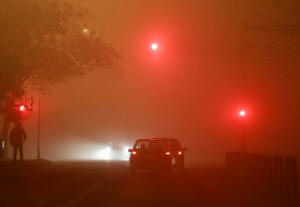|
Macedonia introduces emergency measures
as smog chokes capital
 Send a link to a friend
Send a link to a friend
 [January 16, 2018]
By Kole Casule and Maja Zuvela [January 16, 2018]
By Kole Casule and Maja Zuvela
SKOPJE (Reuters) - Macedonia took emergency
measures against dense smog enveloping its cities, an annual winter
scourge in the Western Balkans blamed on a mix of coal burning, aging
industry and high-polluting emissions from older vehicles.
The government said residents of Skopje and Tetovo had been granted free
travel on trains and buses to discourage use of cars while those with
chronic illnesses and pregnant women were excused from work. Outdoors
sports activities were also banned.
Local media said shops ran out of face masks as many people sought to
protect themselves from the subzero and largely windless air in Skopje,
which sits at the bottom of a valley.
A World Health Organisation (WHO) study published early this year said
Skopje was among 10 European cities with the highest concentration of
toxic particles.

Skopje and four other Balkan cities in that list rely for their energy
including heating during frigid winters on high-polluting lignite coal,
a holdover from decades of old Communist Yugoslav rule.
Sarajevo, Tuzla and Zenica in Bosnia, as well as Kosovo's capital
Pristina, suffer from similar high air pollution.
A recent study by the Health and Environment Alliance (HEAL) found 16
aging, communist-era lignite plants in areas of former Yugoslavia emit
as much pollution as all of the European Union's 296 power plants
combined.
[to top of second column]
|

Vehicle traffic and pedestrians are seen during evening fog and air
pollution covering Skopje, Macedonia December 14, 2017.
REUTERS/Ognen Teofilovski

With an eye on future EU membership, the governments of ex-Yugoslav
republics have pledged to tackle emission levels.
Under the EU's Industrial Emissions Directive, emissions in the
region would have to be reduced by 90 percent for sulfur dioxide, by
67 percent for nitrogen oxides and 94 percent of airborne
particulates by 2028.
But the region plans to invest billions of euros in building more
coal-fired plants with a total capacity of 2,600 megawatts (MW) to
meet rising demand for electricity as old plants are phased out in
the next decade.
Environmentalists fear the renewed investment in coal could backfire
if governments are forced to spend hundreds of millions of euros
more to meet EU environmental standards to qualify for accession to
the bloc.
(Writing by Maja Zuvela; editing by Mark Heinrich)
[© 2017 Thomson Reuters. All rights
reserved.]
Copyright 2017 Reuters. All rights reserved. This material may not be published,
broadcast, rewritten or redistributed.
 |